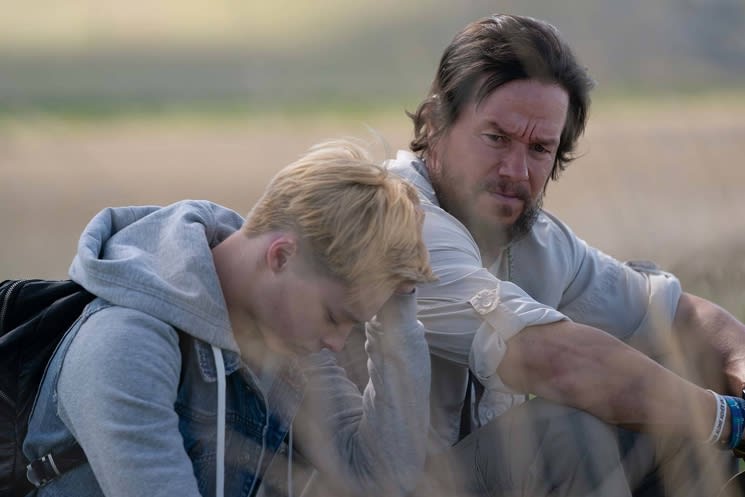Joe Bell offers Mark Wahlberg a dramatic turn without doing much to advance the issues it's attempting to tackle. Talking about intentions in a film is difficult, but in adapting a true story about a family touched by some of the worst impacts of homophobic bullying, one can imagine the filmmakers wanting to amplify a message of inclusion and empathy. Framing this story in the way they do, though, raises questions about who films want to put front-and-centre. Even if Joe Bell acknowledges that, for a character like Wahlberg's rough-around-the-edges Bell, starting these dialogues is where the work begins, the movie is so focused on his personal experience that the broader story feels like a letdown.
The earliest events in the film start in La Grande, Oregon, in the 2010s — not the friendliest place for a gay teen. Jadin Bell (Reid Miller) finds this out seemingly every day at high school, even as he tries to not let the harassment tamp down who is.
His home life isn't much of respite either. His father, Joe (Wahlberg), is accepting in theory only, and is more easily comfortable with a second, straight son who wrestles and hunts. Mother Lola (Connie Britton) isn't taking the lead on making a welcoming environment for their resident Lady Gaga fan.
The film shows the toll of bullying and of tragedy — and it gets to the point where Joe feels that, for himself and to honour his son, he has to cross the country on foot, spreading an anti-bullying message in school auditoriums and diners as he goes.
Screenwriting team Larry McMurty and Diana Ossana play with the chronology, at least partially to try to preserve developments for later in the story, and also to match Joe's emotional arc. So we first meet Joe as he is giving an early talk on the road, not having worked out a routine quite yet. Flipping from Joe's travels to the family's home life covers for the filmmaking twists they're lacing into the story.
The time shuffle also keeps Jadin in the narrative, even while still allowing Joe to be the main character. Britton is flatly underserved in her role, but Miller as Jadin does give a naturalistic performance, helped by being an actor who looks the part of a fresh-faced high schooler. All that said, Joe Bell is focused on Joe's experience.
This is a different role of late for Wahlberg. He's fighting with contradicting emotions, and some moments are backed up in the text of the film. There's a thread of him recognizing how difficult connecting with Jadin is, and Wahlberg plays to that in moments of obstinance and hostility.
But then, making this so much about Joe feels like a problem. He's lamenting the ways in which he never got to know his son. In the process, Jadin becomes an abstraction, at least somewhat unknowable throughout the film.
In this way, Joe Bell falls short of the mark. Considering the experience of this father and his plea for understanding has resonance. But that focus combined, with the twists and elements of the story withheld until late in the movie, muddy that portrait, leaving guys like Wahlberg as the whole vehicle for stories like this.
(Nine Stories Productions)The earliest events in the film start in La Grande, Oregon, in the 2010s — not the friendliest place for a gay teen. Jadin Bell (Reid Miller) finds this out seemingly every day at high school, even as he tries to not let the harassment tamp down who is.
His home life isn't much of respite either. His father, Joe (Wahlberg), is accepting in theory only, and is more easily comfortable with a second, straight son who wrestles and hunts. Mother Lola (Connie Britton) isn't taking the lead on making a welcoming environment for their resident Lady Gaga fan.
The film shows the toll of bullying and of tragedy — and it gets to the point where Joe feels that, for himself and to honour his son, he has to cross the country on foot, spreading an anti-bullying message in school auditoriums and diners as he goes.
Screenwriting team Larry McMurty and Diana Ossana play with the chronology, at least partially to try to preserve developments for later in the story, and also to match Joe's emotional arc. So we first meet Joe as he is giving an early talk on the road, not having worked out a routine quite yet. Flipping from Joe's travels to the family's home life covers for the filmmaking twists they're lacing into the story.
The time shuffle also keeps Jadin in the narrative, even while still allowing Joe to be the main character. Britton is flatly underserved in her role, but Miller as Jadin does give a naturalistic performance, helped by being an actor who looks the part of a fresh-faced high schooler. All that said, Joe Bell is focused on Joe's experience.
This is a different role of late for Wahlberg. He's fighting with contradicting emotions, and some moments are backed up in the text of the film. There's a thread of him recognizing how difficult connecting with Jadin is, and Wahlberg plays to that in moments of obstinance and hostility.
But then, making this so much about Joe feels like a problem. He's lamenting the ways in which he never got to know his son. In the process, Jadin becomes an abstraction, at least somewhat unknowable throughout the film.
In this way, Joe Bell falls short of the mark. Considering the experience of this father and his plea for understanding has resonance. But that focus combined, with the twists and elements of the story withheld until late in the movie, muddy that portrait, leaving guys like Wahlberg as the whole vehicle for stories like this.




